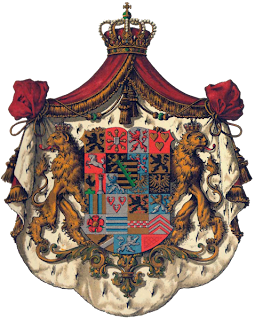Sunday Deposed Monarch Blogging: House of Saxe-Coburg-Gotha
 Like several other major European dynasties, the earliest recorded history of the House of Wettin is found in the tenth century. Through conquest, the family took control of Castle Wettin, and took its name for the dynasty. The family would proceed to control substantial parts of Germany and Poland over the next thousand years, and to provide a pair of kings for Poland, as well as prince consorts for Portugal and the United Kingdom, and kings for Belgium and Bulgaria. Most of these came through a cadet branch of House Wettin named Saxe-Coburg Gotha.
Like several other major European dynasties, the earliest recorded history of the House of Wettin is found in the tenth century. Through conquest, the family took control of Castle Wettin, and took its name for the dynasty. The family would proceed to control substantial parts of Germany and Poland over the next thousand years, and to provide a pair of kings for Poland, as well as prince consorts for Portugal and the United Kingdom, and kings for Belgium and Bulgaria. Most of these came through a cadet branch of House Wettin named Saxe-Coburg Gotha.
Ferdinand of Saxe-Coburg Gotha became Prince Regnant of Bulgaria in 1886, at the age of 25. Bulgaria had acquired de facto sovereignty in 1878, although it nominally remained part of the Ottoman Empire. The first monarch of Bulgaria was Prince Alexander of House Battenberg. Despite leading Bulgaria to victory in war against Serbia, Alexander was deposed by a military coup in 1886. As had been the case with Alexander, Ferdinand was chosen by a combative decision-making process by the Great Powers. Ferdinand was notable mainly for his high position amongst Austro-Hungarian nobility, but was also distantly related to medieval Bulgarian princes. In 1908, the increasing decrepitude of the Ottoman Empire allowed Bulgaria to declare independence, with Ferdinand as its first Tsar.
Bulgaria did very well in the First Balkan War, but lost most of its gains in the Second Balkan War. In hopes of recovering lost territory, Bulgaria joined the Central Powers in 1915. Bulgarian entry into the war doomed Serbia, and in 1916 the Bulgarians made significant gains at the expense of the Romanians. The situation deteriorated in 1918, however, as economic deprivation was intensely felt on the homefront and Allied forces closed in. Ferdinand abdicated in October 1918 in favor of his son Boris, and House Saxe Coburg Gotha was allowed to remain on the throne of a much diminished Bulgarian state.
 The twenty-four year old Boris managed to hold power despite almost continuous fighting between far right and far left elements. He married the daughter of Victor Emmanuel III of Italy in 1937, a union which produced two children. After the new war began in Europe, Bulgaria came under considerable pressure to join the Axis. In 1941 King Boris agreed to declare war against Great Britain and the United States, but not against the Soviet Union. Boris and his government limited cooperation with the Germans, irritating Hitler but saving a substantial portion of Bulgaria’s Jewish population. After meeting with Hitler in 1943, Boris died of an apparent heart attack and was succeeded by his six year old son Simeon. Sofia was struck repeatedly by Allied bombers, and in 1944 Bulgaria abandoned the war and withdrew from military cooperation with the Axis.
The twenty-four year old Boris managed to hold power despite almost continuous fighting between far right and far left elements. He married the daughter of Victor Emmanuel III of Italy in 1937, a union which produced two children. After the new war began in Europe, Bulgaria came under considerable pressure to join the Axis. In 1941 King Boris agreed to declare war against Great Britain and the United States, but not against the Soviet Union. Boris and his government limited cooperation with the Germans, irritating Hitler but saving a substantial portion of Bulgaria’s Jewish population. After meeting with Hitler in 1943, Boris died of an apparent heart attack and was succeeded by his six year old son Simeon. Sofia was struck repeatedly by Allied bombers, and in 1944 Bulgaria abandoned the war and withdrew from military cooperation with the Axis.
 When the Red Army arrived at the borders of Bulgaria, the Soviet Union declared war. For about a week, Bulgaria was at war with both Germany and the Soviet Union. The Red Army quickly occupied Bulgaria, and the government was replaced by a communist regime. In 1946 a Soviet sponsored referendum abolished the monarchy and exiled young Simeon. Simeon grew up in Spain and the United States, but never renounced his claim to the Bulgarian throne. In 1996, after the collapse of the communist regime, Simeon returned to Bulgaria to general acclaim. In 2001 he took a most unusual step for a former monarch, forming his own political party and engaging in electoral politics. His party won the June 2001 election, and Simeon became the Prime Minister of Bulgaria. He served for four years before being turned out in 2005.
When the Red Army arrived at the borders of Bulgaria, the Soviet Union declared war. For about a week, Bulgaria was at war with both Germany and the Soviet Union. The Red Army quickly occupied Bulgaria, and the government was replaced by a communist regime. In 1946 a Soviet sponsored referendum abolished the monarchy and exiled young Simeon. Simeon grew up in Spain and the United States, but never renounced his claim to the Bulgarian throne. In 1996, after the collapse of the communist regime, Simeon returned to Bulgaria to general acclaim. In 2001 he took a most unusual step for a former monarch, forming his own political party and engaging in electoral politics. His party won the June 2001 election, and Simeon became the Prime Minister of Bulgaria. He served for four years before being turned out in 2005.
Prospects for a return to the throne remain uncertain. Simeon’s popularity declined across his term as prime minister, although he remains a major figure in Bulgarian politics. Simeon has remained largely mum about his intentions regarding the throne. Still, the prospects for a return to the throne of House Saxe Coburg Gotha are probably the strongest of any deposed monarchical family in the world.
Trivia: Which monarch served as the head of state of his independent country for only five years, but managed during his life to serve as a royal puppet for three different imperial powers?


